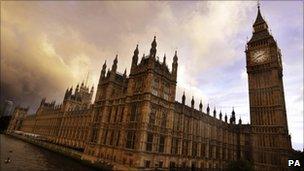Committee to examine privacy law and use of injunctions
- Published

A joint committee of Parliament will be set up to consider whether there should be a change in the law relating to privacy injunctions.
Attorney General Dominic Grieve told the Commons the committee would report back in the autumn on how current arrangements can be improved.
He spoke after the High Court refused to lift a gagging order protecting the identity of a footballer.
David Cameron said earlier that the existing situation was "unsustainable".
The prime minister said the law should be reviewed to "catch up with how people consume media today" and it was unfair that newspapers could not name individuals whose identity being widely circulated on the internet.
'Rule of law'
Mr Grieve was answering an urgent question from Conservative MP John Whittingdale on the issue of injunctions in the Commons.
Mr Whittingdale, who is chairman of the Commons culture, media and sport committee, said the use of social media such as Twitter to breach injunctions was in danger of making "the law look an ass".
He told Mr Grieve: "You would virtually have to be living in an igloo not to know the identity of at least one Premier League footballer who has obtained an injunction."
Lawyers acting for the footballer, known in court as CTB, are taking legal action against Twitter to try to compel it to reveal the names of users who breached the injunction.
The attorney general said the government took the need to balance privacy and freedom of expression very seriously.
"Today the prime minister is writing to my right honourable friend recommending that a joint committee be established to consider how current arrangements can be improved," he said.
"Such a committee will be able to use representation of both Houses and the considerable expertise that select committees have to examine whether the current arrangements are working and to consider whether we might make any changes that would make things work better."
During the debate that followed, John Hemming MP named the footballer at the centre of the High Court case as Ryan Giggs.
Later he told the BBC he had done so because he believed it was "fundamentally wrong" for a high-profile individual to use his lawyers to "go after ordinary people".
"I am accountable to the people who elected me and I don't think they are happy about the way ordinary people are being chased down and threatened in secret," he said.
In recent weeks, several politicians have used Parliamentary privilege - which protects them from prosecution for anything they say in the Commons or Lords - to breach injunctions.
On Friday, the Lord Chief Justice Lord Judge appeared to criticise them when he asked whether it was "a good idea" for politicians to be "flouting a court order" just because they disagreed with it.
Several MPs also raised concerns about the use of privilege during Monday's debate.
In reply, the attorney general said: "It's right to emphasise that just as any change in the law is for Parliament, the interpretation of the law is the responsibility placed on the judiciary.
"Legal mechanisms exist to remedy individual decision which may be mistake, but if we believe in the rule of law it is our duty as parliamentarians to uphold those principles."
Mr Grieve said the protection granted by Parliamentary privilege was "a privilege that must not be abused" and it would be "improper" for parliamentarians to use it to deliberately flout the law.
'Flout the law'
On Sunday it was reported that the attorney general was being asked to consider prosecuting a journalist who allegedly broke a privacy order on Twitter relating to another footballer.
Asked about this, Mr Grieve said he had "received no referral whatsoever in relation to an civil contempt of court".
Mr Hemming also named the journalist in question in the Commons.
Speaking afterwards, Mr Whittingdale welcomed the decision to set up the committee but said he "regretted" Mr Hemming's decision to use Giggs' name.
"If the law is wrong MPs should change the law rather than flout the law," he said.
Shadow justice secretary Sadiq Khan said the government appeared to be "in a muddle" about its policy on injunctions.
"The government appears to be at sixes and sevens on its policy on privacy injunctions and the freedom of the press," he said.
- Published23 May 2011
- Published23 May 2011
- Published20 May 2011